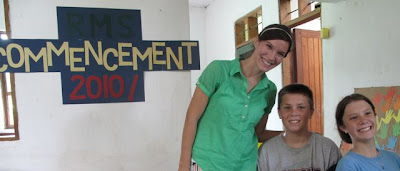I sit on a screened porch only a few hundred meters from the patch of woods and log cabin where my grandfather was born, deep in a hollow along the Buckhannon River known as Sago. Population in the dozens, except for a horrific week a few years ago when coal miners were trapped and killed. When I was a child my parents bought an old farmhouse on three acres of land adjacent to the family property (when you're 15th of 15 kids, you have to take some initiative). Slowly but surely they fixed it up, installed plumbing where there had been only an outhouse and a bucket lowered by rope into a well. Added bedrooms and porches, a modern kitchen, laundry, landscaping. So that the place now comfortably sleeps almost 20. This is where I spent most summer weeks and Fall and Spring weekends growing up, and is a piece of the earth I love. Even our kids feel more at ease, away from the hectic suburbia that Northern Virginia has become, in a place where a neighbor dropped by in her pick-up last night to bring us a bag of tomatoes she'd just picked from the garden, and no one hesitates to engage in conversation. Where people across the river called out to us as we floated by on kayaks, and identified themselves by their "clan" name.
No internet, and no cellphone coverage. Lots of games, hiking, swimming. Yesterday we walked up the railroad tracks a mile or two and found a great cluster of high rocks to jump from into the river, then swam and waded all the way back downstream to "Camp".  Last night Luke and Caleb, armed with a guitar, a 22, a tarp, a masai blanket, and a box of matches, slept under the stars in a hilltop meadow, where deer graze. Today lots of napping, reading, kayaking. Shooting tin cans off the railroad track, or clay pigeons from a skeet thrower.
Last night Luke and Caleb, armed with a guitar, a 22, a tarp, a masai blanket, and a box of matches, slept under the stars in a hilltop meadow, where deer graze. Today lots of napping, reading, kayaking. Shooting tin cans off the railroad track, or clay pigeons from a skeet thrower.
 Last night Luke and Caleb, armed with a guitar, a 22, a tarp, a masai blanket, and a box of matches, slept under the stars in a hilltop meadow, where deer graze. Today lots of napping, reading, kayaking. Shooting tin cans off the railroad track, or clay pigeons from a skeet thrower.
Last night Luke and Caleb, armed with a guitar, a 22, a tarp, a masai blanket, and a box of matches, slept under the stars in a hilltop meadow, where deer graze. Today lots of napping, reading, kayaking. Shooting tin cans off the railroad track, or clay pigeons from a skeet thrower. Very thankful for this almost-heaven home.











































